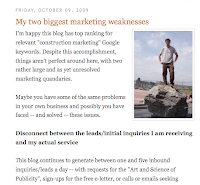 We all have strengths and weaknesses. Of course we need to work within our weaknesses, but in business, we should focus on our strengths.
We all have strengths and weaknesses. Of course we need to work within our weaknesses, but in business, we should focus on our strengths.I thought about this yesterday evening, returning home from a board of directors meeting of the Ottawa Construction Specifications Chapter where I committed to a Jan. 12 presentation on social media and online marketing.
Our son, Eric, had just arrived home from a hockey practice that I had directed his entire team (I am the team manager) to attend.
Trouble is, I had sent him -- and the entire team -- to a practice that had been rescheduled, and two other teams were booked for the ice.
The "rationalization" for this scheduling error which disrupted the lives of 15 kids (and their parents), is the league co-ordinators revised the practice schedule several times and I had an earlier version. But this is not a good excuse. My job includes a responsibility to be careful about the details. (The other teams helped out last night by allowing our team to share the ice.)
I'm simply not very good at details.
This means I would not make a very good accountant. Sure, I can grasp the big picture and make sure that the overall business can run properly, but you wouldn't want me to balance the books!
Should we focus on our weaknesses, however, and let them dominate our minds?
No. The challenge is to figure out how to use our strengths to over-ride the weaknesses.
In this case, my wife (who is a detail person) agreed to check the schedule -- then she had to call on me to show her how to read the computerized entries (my strength, her weakness).
You certainly can enlist others to help.
Other weaknesses require your own attention and effort, generally if they impede in your ability to achieve your fullest strengths.
Sometimes you just have to get experience. I don't have experience in public presentations, but know it is important to develop this ability -- so the Jan. 12 presentation is a good start. If I fail, it isn't the end of the world; if I succeed (I will . . . ) it is a stepping stone to larger things.
Finally, sometimes you need to give special effort and hard work to overcome your weaknesses. the best way to do this is to use your strengths as a motivation.
I am a competent writer, and really good at journalism, but lacked any social skills or interpersonal relationship-building talent as a young person. This could of course be a rather serious barrier to a successful life. I solved the problem by fully expressing my strengths with an African adventure -- which then allowed me the opportunity to overcome many, but not all of my weaknesses.
The basic rule is this:
Do what you love, and you do well, and you will find your weaknesses either become insignificant as others compensate, or you have the energy, resources, and ability to work around them.
But my son still gave me a (well-deserved) glare when he returned home from the practice that wasn't supposed to be.












